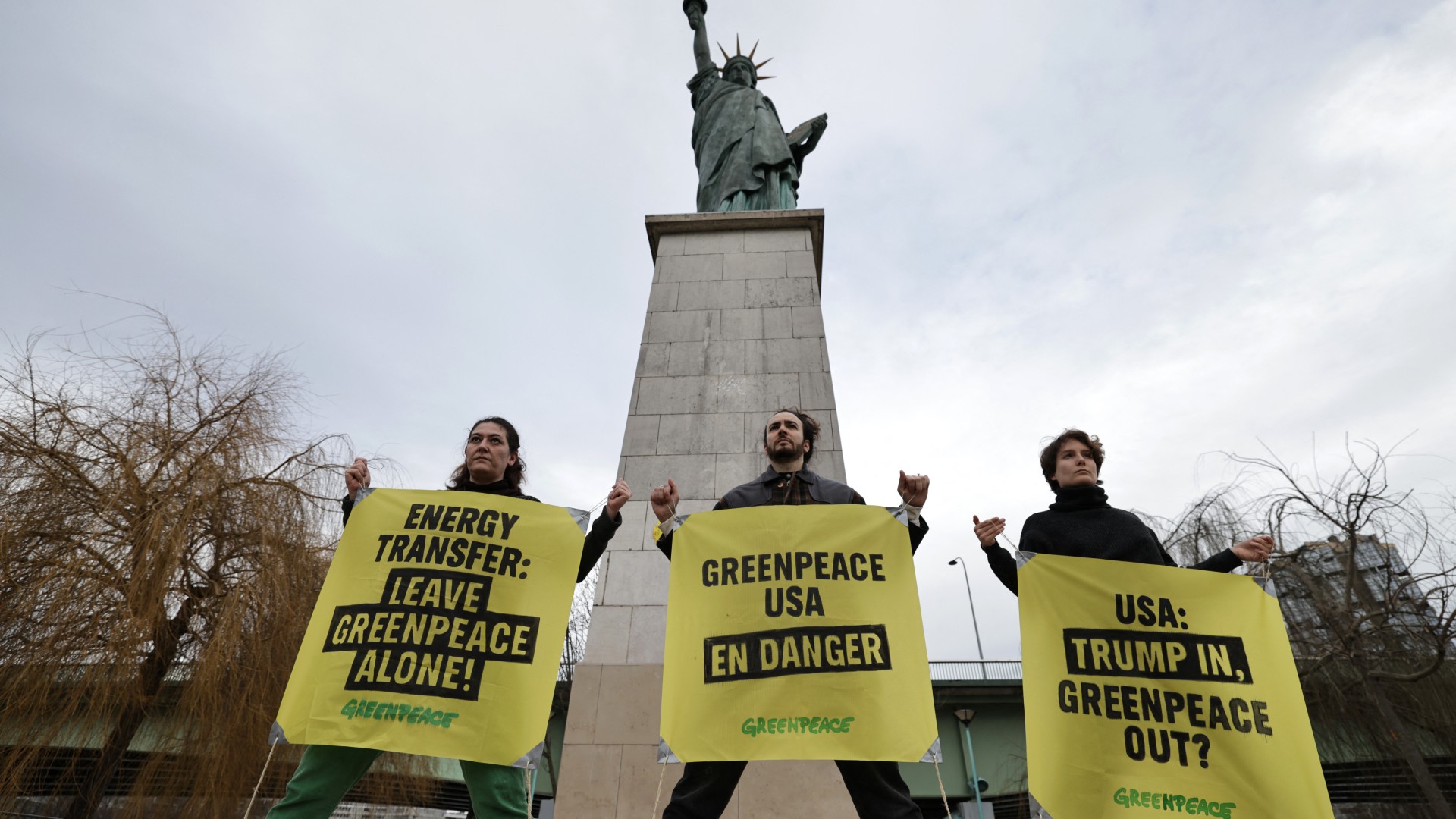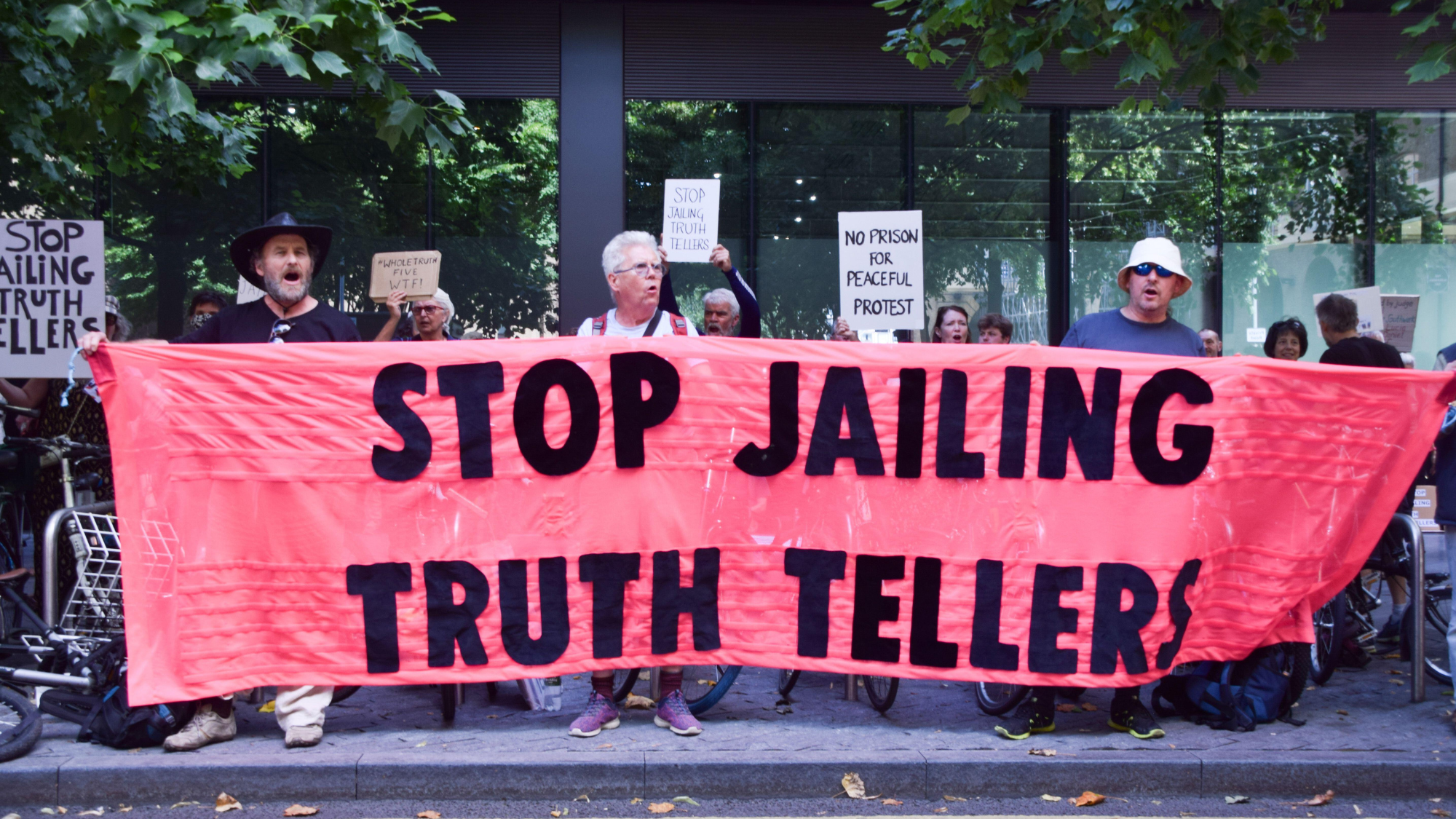$300M lawsuit against Greenpeace has environmentalists on edge
The organization says the future of advocacy and free speech is at risk


A free daily email with the biggest news stories of the day – and the best features from TheWeek.com
You are now subscribed
Your newsletter sign-up was successful
Jury selection just began for a lawsuit filed against Greenpeace in Morton County, North Dakota, kicking off a trial for a grievance that began nearly a decade ago. Environmentalists say the $300 million lawsuit filed by a pipeline company is an attack on First Amendment rights.
An attempt to silence a movement?
The protests at the center of the lawsuit began in 2016 after the approval of the Dakota Access pipeline. The Standing Rock and other Sioux tribes protested the pipeline, which runs below a reservoir on the Missouri River. The affected population's fear was that the pipeline would pollute their water with leaked oil.
Thousands of demonstrators, staying at a camp in a remote area near the Cannonball and Missouri rivers, stood with the protesting tribes. Greenpeace showed up to assist the organizing Indigenous groups and support the Indigenous People's Power Project, a "nonprofit group that teaches protesters nonviolent direct action tactics," said Truthout. The pipeline received federal approval from the first Trump administration in 2017 but continues to be subject to ongoing litigation.
The Week
Escape your echo chamber. Get the facts behind the news, plus analysis from multiple perspectives.

Sign up for The Week's Free Newsletters
From our morning news briefing to a weekly Good News Newsletter, get the best of The Week delivered directly to your inbox.
From our morning news briefing to a weekly Good News Newsletter, get the best of The Week delivered directly to your inbox.
The Dallas company Energy Transfer filed a lawsuit against Greenpeace in 2017, accusing the organization of inciting and orchestrating the protests. Energy Transfer, which operates the 1,100-mile pipeline that carries oil from western North Dakota to Illinois, alleges that Greenpeace encouraged violence to damage Energy Transfer's profits and reputation. Greenpeace and Indigenous movement organizers "expressed outrage at the narrative woven by the pipeline company," Truthout said. "It's history repeating itself," Indigenous NoDAPL (No Dakota Access Pipeline) organizer Waniya Locke said to the outlet. It is "discomforting that they're trying to erase the Indigenous narrative straight across the boards, from education to big media, down to this lawsuit."
Many environmentalists see the lawsuit as a clandestine intimidation tactic "intended to instill fear throughout the broader movement," said The Washington Post. Activists say they are being increasingly targeted by what they call a "strategic lawsuit against public participation." Critics have historically defined these cases as "meritless defamation lawsuits brought by major companies to silence critics and force them into years of expensive litigation."
A 'critical test of the future of the First Amendment'
Unfortunately, North Dakota is among 15 states that do not have anti-strategic lawsuit against public participation laws, which "make it easier to get such cases dismissed and recover costs from plaintiffs that file them," NPR said. So even if Greenpeace wins the lawsuit, it would cost the organization significant money for attorney fees and other costs. If the organization loses the case, it could "face financial ruin, ending over 50 years of environmental activism," Greenpeace USA said. Beyond the potential financial blow, the trial will be a "critical test of the future of the First Amendment, both freedom of speech and peaceful protest under the Trump administration and beyond," Greenpeace's interim director, Sushma Raman, said in public remarks.
If Energy Transfer wins against Greenpeace, "it would not only be devastating to Greenpeace, but it would inspire other companies to take more actions against their opponents," said Michael Gerrard, the director of the Sabin Center for Climate Change Law at Columbia University, to the Post. "It could have a real chilling effect."
A free daily email with the biggest news stories of the day – and the best features from TheWeek.com
In the meantime, Greenpeace is fighting against Energy Transfer in other ways. The European Union has a directive against these types of strategic lawsuits, one that offers some protection to groups within the E.U.'s borders. Citing that directive and other Dutch laws, Greenpeace International filed a countersuit against Energy Transfer in Amsterdam, where Greenpeace is based, to recover costs incurred during the lawsuit. The first hearing for the countersuit is set to be held this summer.
Theara Coleman has worked as a staff writer at The Week since September 2022. She frequently writes about technology, education, literature and general news. She was previously a contributing writer and assistant editor at Honeysuckle Magazine, where she covered racial politics and cannabis industry news.
-
 What to know before filing your own taxes for the first time
What to know before filing your own taxes for the first timethe explainer Tackle this financial milestone with confidence
-
 The biggest box office flops of the 21st century
The biggest box office flops of the 21st centuryin depth Unnecessary remakes and turgid, expensive CGI-fests highlight this list of these most notorious box-office losers
-
 What are the best investments for beginners?
What are the best investments for beginners?The Explainer Stocks and ETFs and bonds, oh my
-
 ABC News to pay $15M in Trump defamation suit
ABC News to pay $15M in Trump defamation suitSpeed Read The lawsuit stemmed from George Stephanopoulos' on-air assertion that Trump was found liable for raping writer E. Jean Carroll
-
 The Just Stop Oil five: 'fanatics' or victims of anti-protest authoritarianism?
The Just Stop Oil five: 'fanatics' or victims of anti-protest authoritarianism?In the Spotlight Climate protesters handed longest-ever prison sentences for peaceful protest
-
 How a Cherokee tribe used tribal sovereignty to open North Carolina's only legal cannabis dispensary
How a Cherokee tribe used tribal sovereignty to open North Carolina's only legal cannabis dispensaryUnder the radar The tribe has plans to open sales to any adult in the state, even though the drug is still illegal there
-
 Georgia's new foreign influence bill
Georgia's new foreign influence billUnder the Radar Critics claim the 'Russian law' could stifle dissent and wreck the country's chances of joining the EU
-
 Trump and his lawyer Alina Habba have a rough day in defamation court
Trump and his lawyer Alina Habba have a rough day in defamation courtSpeed Read Trump's audible grousing as E. Jean Carroll testified earned him a warning he could be thrown out of court, and Habba showed she 'doesn't know what the hell she's doing'
-
 10 states sue FEMA over flood insurance rate hike
10 states sue FEMA over flood insurance rate hikeSpeed Read
-
 E. Jean Carroll seeks further damages from Trump over CNN remarks
E. Jean Carroll seeks further damages from Trump over CNN remarksSpeed Read
-
 E. Jean Carroll may sue Trump over 'foul' CNN remarks
E. Jean Carroll may sue Trump over 'foul' CNN remarksSpeed Read
